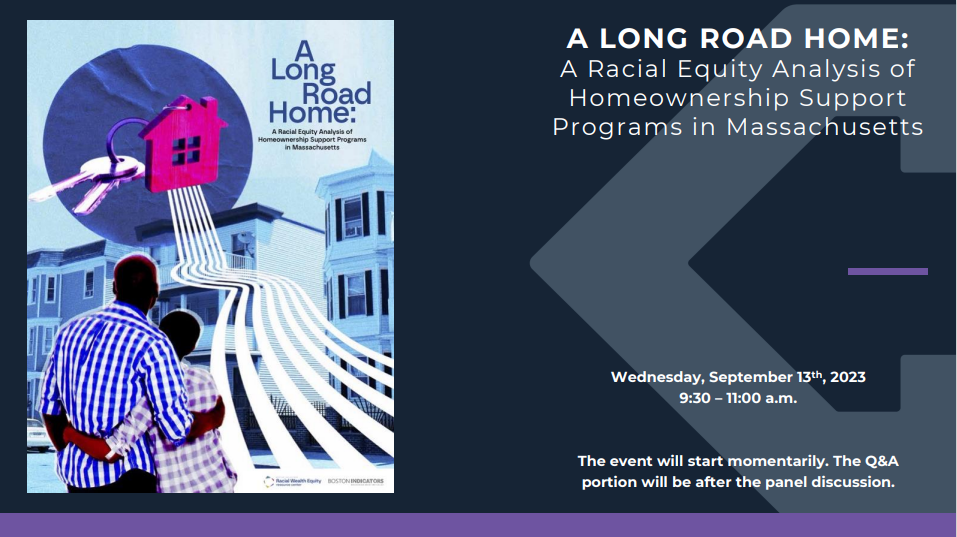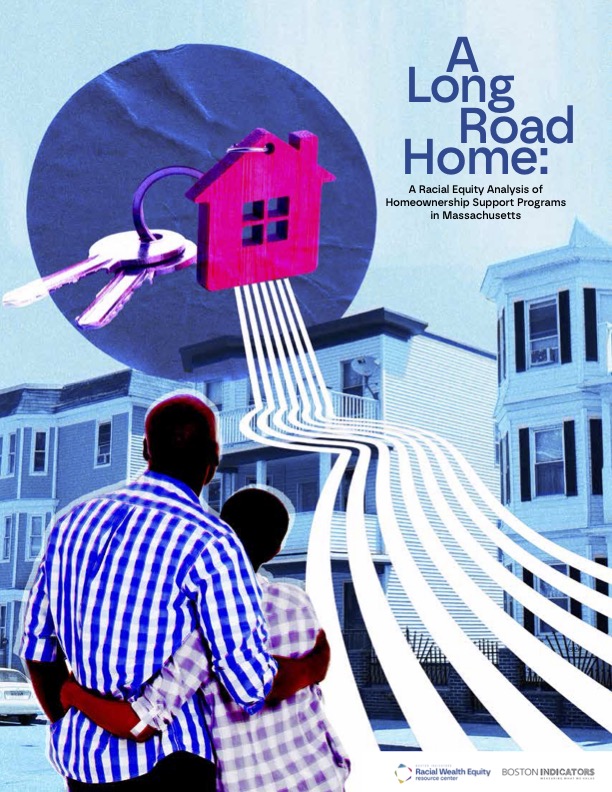A Long Road Home: Report Release
September 13, 2023
The Boston Foundation opened its 2023 fall events season on September 13 with an in-depth examination of homeownership support programs in Massachusetts. At an in-person forum with remote live-streaming, Boston Indicators officially released A Long Road Home: A Racial Equity Analysis of Homeownership Support Programs in Massachusetts, with authors presenting findings and a panel of housing experts discussing the issues raised.
First, those issues were made visible—literally—with a video that introduced some of the challenges in our system through voices representing prospective homebuyers, first-generation homeowners, realtors, and advocates.
The personal stories told in the gave a human dimension to the data in the report, which looks at interventions aimed at increasing homeownership among people of color, particularly those with low and moderate incomes. Researchers Anne Kiyono Calef, Aja Kennedy, and Kelly Harrington of Boston Indicators shared top-level takeaways from the report, including a landscape scan of affordable homeownership programs and policies, an analysis of select programs that support homebuyers and homebuilders, and a series of policy recommendations based on these findings.
In short, Massachusetts has many promising programs that are measurably helping people achieve the dream of homeownership. At current scale, however, they can’t match the need, and finding supports can be confusing to would-be participants—if those homeseekers even know they exist.
This thorough backgrounding made for a lively discussion with three panelists who know the programs well. Symone Crawford of MAHA, Clark Zeigler of MHP, and Chrystal Kornegay of MassHousing, all Executive Directors of their organizations, shared their thoughts in a conversation moderated by TBF’s housing specialist Soni Gupta.
They covered strategies that have led to success—chief among them a focus on the human dimension of homebuying. For one thing, it’s important to have housing support experts who’ve been through the process themselves or grew up in the neighborhood and know the dynamics at play. As Crawford said, “Black and Brown individuals can share their own experiences with new hopefuls who fear they can’t do it.” Kornegay also emphasized trust: “A home is one of the most personal, largest purchases you’ll ever make and it’s scary. How do you find out about it? Learn from someone you trust.” And they covered challenges—one being simply that so many prospective homebuyers don’t know their options. As Zeigler said, “We need a massive outreach and marketing effort. We have to be out there and visible and credible. It’s great to look at the data but this calls for the human touch, meeting people where they are. It’s more difficult but it’s by intentionality and reaching out that we make progress. Hiring an ad agency isn’t going to solve it; it’s largely a human project.”
An ongoing challenge is how to make sure that racial equity is served justly by these programs. For centuries Black people were deprived of the ability to purchase and own homes by policies and systems both overt and subtle in their discrimination. Panelists pointed out that because of past discrimination, more people of color have no homeownership in their family tree and so can be targeted with a focus on first-generation homebuyers. Geographically-focused programs also can serve areas with a higher proportion of Black and Latino clients. The report includes stats showing that these targeted efforts can increase homeownership among targeted groups while following fair housing laws.
Over the course of the conversation, panelists agreed that there are several things needed in Massachusetts:
- Increasing funding for all these programs. This tops the list, given the need and the outrageous cost of housing in our region.
- Getting more lenders involved in serving this population (the research showed program-supported homeowners defaulted at a lower rate than others).
- Getting more realtors and brokers up to speed on the policies and programs that could get their clients over hurdles to closing on a home; possibly with mandatory training in the subject through their licensure and continuing education requirements.
- Increasing supply at all levels: Allow accessory dwelling units by right across the Commonwealth; consider prefab homes for lower-cost and speed.
- Electing leaders who have experienced the challenge of trying to buy a home without significant personal wealth.
To that last point, Kornegay added, “It’s not just legislators. It’s you. Go to meetings in your town. You don’t have to do anything, just be there, listen. You’ll learn the system and then you’ll want to speak up. I know you’re busy, everybody’s busy – except the people who want to stop the (housing) you need. Somehow, they’re not as busy as you.”
Panelist also raised the the need for more programs that go beyond homebuying to ensure homeowners have what they need to keep their homes, such as affordable maintenance or bridge payments in cases of emergency. Crawford noted, “Homeowners are suffering because they can’t afford to update or repair their homes. We want to create a program to help provide that support so they can do upkeep, increase green elements in their home, etc. We have to do something from a public perspective to preserve the homeowners we have.”
“Generational wealth needs you to stay in the house a long time,” Kornegay added. “Buying a house is the beginning, not the end.”


Agenda
Video Presentation
A Long Road Home - short video presentation with interviews from current and hopeful homeowners
Report Presentation
Anne Kiyono Calef, Research Manager, Boston Indicators
Kelly Harrington, Senior Research Manager, Boston Indicators
Aja Kennedy, Racial Wealth Gap Research Fellow, Boston Indicators
Panel Discussion and Audience Q&A
Symone Crawford, Executive Director, Massachusetts Affordable Housing Alliance
Soni Gupta, Associate Vice President, Programs, The Boston Foundation (Moderator)
Chrystal Kornegay, Executive Director, MassHousing
Clark Ziegler, Executive Director, Massachusetts Housing Partnership
